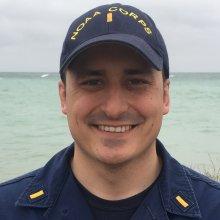
Hunter Brendel
Tell us about your work/research. What kinds of things do you do?
I am a uniformed officer trained to serve in a variety of roles for conducting scientific operations. Prior to my current assignment in the Great Lakes, I was navigation officer on a ship in the Atlantic Ocean that conducted a variety of projects including fisheries stock assessments, fish habitat mapping, underwater exploration, and oceanographic buoy tending. While on a ship, I am away from home for up to six months at a time, and I rotate assignments every two or three years. As a vessel operations coordinator, I help manage several small boats that support scientific operations in all the Great Lakes. These operations include buoy tending, plankton assessments, survey, and underwater exploration work. I am primarily a ship-handler, navigator, scuba diver, firefighter, and administrative specialist.
What sparked your initial interest in your career?
I have always wanted to be in a uniformed service to give back to the nation and pursue opportunities that I could not have anywhere else. I was also interested in archaeology and the study of people and how we interact with our environment. After hearing about the NOAA Commissioned Officer Corps, I immediately applied because it combines my drive for service and passion for conservation into a career that I can be proud of.
Who influenced you or encouraged you the most?
I am incredibly lucky in that I have prior supervisors and professors who have mentored me through my journey. Keeping in touch with the people who encourage me has been instrumental in my development. Having that support is crucial, especially when I encounter adversity along the way.
What element of your work/study do you think is the most fascinating?
The variety of work in my job is incredible. I help deploy buoys one week and sample for fish the next week. My job takes me all over the country and different bodies of water and demands that I be flexible. There is rarely a dull day on the job, and I would rather it not be any other way.
What other jobs led you to your current career?
Prior to my career as a NOAA Corps officer, I was a maritime archaeologist working on excavating and conserving shipwrecks, primarily off the coast of Florida. Part of my job included public outreach such as giving public museum tours and presenting at conferences. I also conducted terrestrial archaeology surveys for cultural resource management firms. On the side, I was a field technician for biology projects. Throughout my career, I have challenged myself to wear different hats and try new things until I felt comfortable with my job. This includes jobs in real estate, information software, food service, media and outreach, customer relations, and ranching. Every job can be built upon and lessons applied to the next.
What are your degrees and certifications?
Bachelor of Arts in Anthropology and Urban Studies -- University of Texas at Austin 2012. Master of Maritime Archaeology -- Flinders University (South Australia) 2015, Master of Public Administration -- University of North Carolina at Chapel Hill Current, Registered Professional Archaeologist (RPA), NOAA Officer of the Deck (OOD), NOAA Diver
What are your hobbies?
I love traveling and exploring new places. I also enjoy reading, audiobooks, listening to the radio and I am a bit of an economics geek.
How did you get involved with the TBNMS project with OET?
I support small boat operations on the Great Lakes with R/V Storm for this project.
What advice would you give someone who wants to have a career like yours?
Start early and develop connections while in high school/undergrad. If I would have known about the NOAA Corps sooner, I would have volunteered or interned early on, spoken directly to officers about what is expected and then carry out those expectations. However, nothing is ever perfectly planned from the start. Don't be afraid to try new things, even if they're not interesting at first, because they might lead to something fulfilling.
